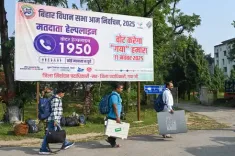What is Tamil Nadu's New Underwater Archaeological Exploration at Poompuhar?

Synopsis
Key Takeaways
- Tamil Nadu initiates significant underwater archaeological exploration.
- Collaboration with Indian Maritime University enhances research capabilities.
- Poompuhar's historical importance as a trade hub is being investigated.
- Interdisciplinary team approach will yield comprehensive insights.
- Project aims to document and elevate Tamil cultural heritage globally.
Chennai, Sep 20 (NationPress) The Tamil Nadu State Department of Archaeology, in partnership with the Indian Maritime University, has commenced an underwater archaeological exploration at Poompuhar in Mayiladuthurai district, which is historically referred to as Kaveripoompattinam.
The objective of this endeavor is to reveal material remnants of one of the most renowned ancient port cities in Tamil history.
Poompuhar holds a significant position in Sangam literature, post-Sangam epics, and inscriptions, recognized as a vibrant center of maritime commerce during the reigns of the Chola, Chera, and Pandya dynasties.
Ancient texts frequently depict the port city as a pivotal point for overseas trade, cultural interactions, and maritime growth.
Despite its regular mention in Tamil literary works, vast sections of its historical landscape remain submerged under the sea due to centuries of coastal erosion and submersion.
This new project, directed by archaeologist K. Rajan, will engage in comprehensive underwater surveys and explorations to locate traces of ancient settlements, port infrastructures, and trade-related activities in the area.
The research team comprises TNSDA Joint Director R. Sivanantham and various technical experts from the fields of both archaeology and maritime studies, contributing an interdisciplinary methodology to the exploration.
While announcing the project, Tamil Nadu Minister for Finance and Archaeology Thangam Thennarasu emphasized the state government's dedication to documenting and highlighting Tamil history through meticulous scientific approaches.
He stated, "This initiative serves as a vital move towards illuminating the cultural heritage of the Tamils and establishing its presence on the global stage."
Furthermore, he noted that under the guidance of Chief Minister M.K. Stalin, the government prioritizes initiatives that investigate the origins and continuity of Tamil civilization.
Officials indicated that the outcomes of the underwater studies are expected to provide essential insights into the socio-economic and cultural aspects of ancient Tamil society.
This exploration will also contribute to understanding the region's involvement in international maritime trade, especially its links with Southeast Asia, the Mediterranean, and beyond.
By integrating literary traditions with archaeological findings, this project aims to present a more thorough depiction of the maritime legacy of Tamil civilization.
Experts believe that the findings could enhance historical comprehension and reinforce Poompuhar's status as one of the ancient world's preeminent port cities.









